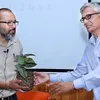[Tech30 Special Mention] This Hyderabad startup aims to bring greener solutions using nanocomposites
Nanospan Technology, a Tech30 special mentions startup, is an R&D pioneer in graphene and nanocomposites that develops cutting-edge materials for energy storage, defence technology, and smart homes.
When it comes to building new products for a greener future, many startups are now focusing on sustainability. With that concept in mind, VenkataRamana Gedela and Ravi Nuguru founded Nanospan Technology.
Established in 2015, Hyderabad-based is a research and development pioneer in graphene and nanocomposites that develops cutting-edge materials for energy storage, defence technology, and smart homes.

Co-founders Ravi Nuguru and VenkataRamana Gedela
With its technical expertise, the startup has been infusing eco-friendly graphene and other nano additives with other materials to form nanocomposites, optimised with improved strength and better performance. At present, it is working on products for two different verticals — smart homes and energy storage.
The nanomaterial-based B2B startup has made it to the special mentions category of YourStory’s curated list of Tech30 startups this year.
Creating unique nanocomposite products
“Our core product is the nanocomposite — made with bulk-produced graphene combined with nanomaterials — which can further create products that pave way for sustainability,” Nanospan Co-founder VenkataRamana Gedela tells YourStory.
One of its unique products is the conductive ink — a part of the smart home vertical. What otherwise seems like wall paint can be utilised to even replace switchboards.
This carbon-based conductive and functional ink is usually used for fabricating flexible electronics, wearables, RFID, printed antennas, smart packaging, etc. Unlike the usual conductors, the ink is insulated in itself due to its non-metallic nature, and only requires the allocation of gestures to perform a certain function.
“You can also allocate IoT functions like a proximity sensor, and the ink will function in that exact way, but will look nothing like it. The level of customisation that this ink can provide is quite vast, and the user decides how it looks,” VenkataRamana adds.
Nanospan is already doing proof-of-concept trials with Lowe’s Innovation Labs, Bengaluru, to grow and market this unique ink. It has also supplied DRDO with its smart fabric and other defence materials.
For India’s promising EV sector, Nanospan has created a distinctive product called the EV range extender system (EVRE) — which is a combination of dry electrode Lithium-ion batteries and supercapacitors cells.
One of the major hurdles in the success of electric vehicles in India is the imported wet electrode Lithium-ion batteries that underperform, owing to the country’s urban traffic conditions.
Nanospan claims that EVRE can go a long way in addressing India's unique EV requirements as it offers high safety, fast charging capability, environmental tolerance, low cost, and very high cyclic life.

Two of Nanospan's products - conductive ink and GCC admixture
For the defence sector, it provides graphene bulletproof polymer composites, ballistic/blast/fireproof materials, and hydrophobic and radiation shielding concrete materials.
Nanospan has received many awards and recognitions such as the Indian Oil Corporation Grant for developing super-capacitors pack with its electrode technology. It is also a cohort of Lowe's ‘Construct’ 2020 accelerator programme for smart home products.
Additionally, it got featured on Silicon India’s cover story for ‘10 most promising Energy Solutions of 2019.’ In fact, Nanospan has an international patent to its name in energy storage and has also filed for nine other patents.
Bootstrapped since inception, the startup is looking for Series A investment. It also plans to raise an investment of $7.5 million to accelerate its research and development, customer proof of concept, and the scaling of its patented electrode fabrication.
Building sustainability
“Graphene and carbon nanomaterials are the future for a greener planet. All our cutting-edge products and material choices have been engineered with the primary goal of manufacturing in an eco-friendly manner,” says VenkataRamana.
When it comes to energy storage, Nanospan’s dry electrodes avoid toxic solvents and reduce energy and water consumption. “Our material and process choices simplify the manufacturing steps to achieve the cost savings,” he says.

Team Nanospan
Its green cement composite additives for smart homes claims to harbour 30 percent greater compression strength, 50 percent lesser water consumption, and 50 percent lesser setup time — much better than today's concrete grades. Besides, it also provides water repellence, earthquake resistance, ionic radiation shielding, and anti-microbial properties in its concrete mix.
“The liquid exfoliation graphene bulk production technique that we invented and perfected is also an eco-friendly process. We make high-grade graphene without using the usual toxic solvents,” says VenkataRamana.
Road ahead
Nanospan plans to deploy its products in the coming months. While some of them have completed the proof-of-concept process and are all set for field trials, some are still in the R&D phase.
“With Nanospan, we aim to innovate in India, make in India, but export outside India. So, in the next 1.5-2 years, we are looking at scaling our products, while also patenting the technology. At the same time, we also aim to educate our customers about our various concepts since we’re still testing the waters,” says VenkataRamana.
Edited by Suman Singh


![[Tech30 Special Mention] This Hyderabad startup aims to bring greener solutions using nanocomposites](https://images.yourstory.com/cs/2/98c65090592f11ea9f62339ce853ca75/Imageehca-1603966409672.jpg?mode=crop&crop=faces&ar=2%3A1&format=auto&w=1920&q=75)






